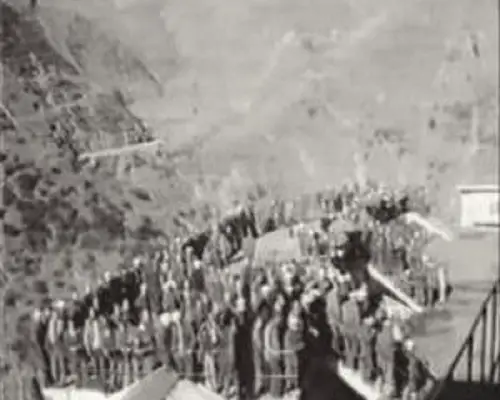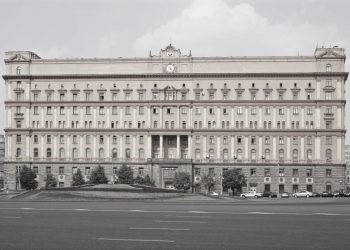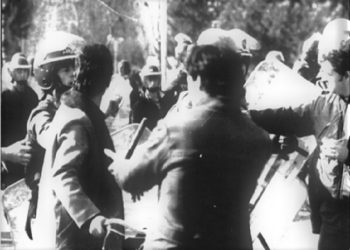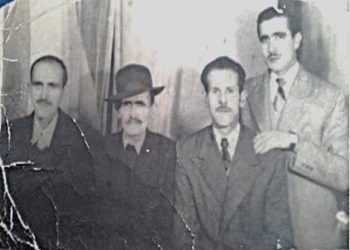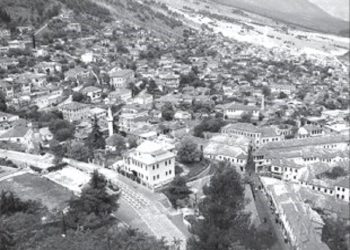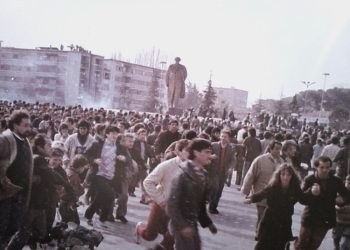Dashnor Kaloçi
Part seven
Memorie.al publishes some parts of the voluminous autobiographical book in manuscript “Beautiful land, ugly people” (memories from hell) by the author, Kasem Hoxha, originally from the village of Markat in Saranda and living in the USA since 1985, when he fled Albania after suffering ten years in the prisons of Enver Hoxha’s communist regime. The whole sad and painful story of Kaso Hoxha, from the life and hard work in his village in the southernmost part of the country, the dissatisfaction with the regime and the first poems of a political nature, how they fell into the hands of the State Security and who were his relatives who spied on him, the arrest in the office of the Chairman of the People’s Council of Markat village, by the State Security on June 21, 1973, the investigation in the Saranda Branch of Internal Affairs, the trial against him and the sentence with 10 years in prison for “agitation and propaganda”, staying in “Kaushin” of Tirana (Ward 313), and the prisoners he found there, being sent to Spaç and working in that camp with criminal and “soft” police officers, the accomplices of description of their “portraits” with positive and negative sides, release from prison and return to the countryside, escape to Greece and stay in the Lavros camp, gaining political asylum in the USA, correspondence with Amnesty International, e London branch, inf information with the data he sent to the prisoners of Spaç and the communist regime in Albania, to the creation of a new family and life and work in that distant place with the Cham community divided by the intrigues of the people of the State Security from Albania operating there.
Excerpts from the manuscript book, “Beautiful land, ugly people“, (memories from hell) of the author, Kasem Hoxha, sent by him exclusively for Memorie.al
Prologue
Dear readers!
Do not pay attention to the title I am presenting to you, I mean, if you are not patient to read this collection of memoirs, if you want to forgive the author, that his style is pale, uninspired before this drama of great, of my people, of my martyred nation.
My characters are not created by my imagination, but are real people, they are your brothers, your fathers, your relatives. The events are not fictional, but real and lived. You will convince yourself, only after reading this summary with memories. You will find something from your life, something real from the lives of your fathers, your mothers, your brothers, how they suffered and how they died.
I wrote this collection of memories about the legacy left to me by my friends, for the world to learn the truth, how innocent people were tortured, how they suffered, how they died, in the camps and prisons of the executioner, Enver Hoxha!
I go with the hope that any reader, Albanian or foreign, is not left with hatred, from criticism, beating opposing opinions, as it is the best way to find the truth. The title of the book, “Beautiful land, ugly people”, will anger the reader, but in the end, I will conclude that I have the right to call it “The 45-year era of the satanic communist regime of Enver Hoxha”: Ugly.
I, alas, for the misfortune I had, saw and lived the great drama that happened before my eyes. I am neither a poet nor a orator, I will need hard work to escape the literary mistakes in this historical book, which can inspire future poets and writers, on the tragedy of our time, of the darkest time of my nation !
Ladies and Gentlemen, I wish you all freedom and peace…!
Kaso Hoxha.
Llavrio, Greece 1985
Continued from the previous issue…
Zeqiri and Hajriuni were working well, the sweat was draining, even though they had removed the half-naked clothes in this heat of more than 40 degrees, they cleaned the cure, Hidajet started to put the prepared bodies. We had the remains of the big ones to fix the bodies and make the mine holes.
Hidajet lets me know how much he has to say to me and said: said: “Try to start making burials before others!” ‘Why did they ask’? “Because you will repress the air and the land with the hours of” Martel “, (the air pistol) returned to me.
And indeed, with his eyes closed and his eyes closed, Hidajeti and the bodyguards took the pistol to open the holes and for half an hour he finished. The holes should be more than 60cm., Otherwise the policemen would place the mines and not accept them. Hidajet completes the one-day work cycle ahead of schedule. He took us to a place in the gallery where there was a lot of water, acidic water, not good for swallowing, and we left the papules and the dusty face. We have to leave the Gallery except at 7 in the morning, but at this time the gallery will enter first.
The night before the gallery
The policeman, Mark Marku, was waiting for the gallery, as we had to be lined up and counted before entering the prison. The Hidajet group left first on mine. The police asked: “How does work look like, you are alone tomorrow”? “I will try to complete the cycle,” I replied. Meanwhile, the Sheriff comes out, I did not know him at all, he covered his face. He approached me and I was scared, because he was a colored man. “Go on Kasem”, previously whispered to the police.
Sherifi did not discourage the heavy work of the gallery, he remained spiritually strong, unbreakable. I was shocked, I proved it.
The line should be two-dimensional and slow, holding the forearm. We went to jail for only 5 minutes straight to the bathroom. However, the first night was not very difficult.
Sunday came, the day of rest for all, on Sunday the tours changed, when the third tour would return the first tour, and if the first tour would return the second. More than 400 detainees worked in the zones. So our brigade, which was on Tuesday, woke up at 6 o’clock in the morning.
On Sunday morning, the room was filled with prisoners, mostly curious about the singer heard in Albania, where they demanded that the Sheriffs sing one of his songs. He was further encouraged by a prisoner who called him Hysen Xhani, whom we briefly referred to as “Loçe”. He, in order to remove the Sheriff’s defense, started singing in French and impressed everyone, including the Sheriff himself. But for a long time, the police officer Prenk Rrapi came and dispersed the crowd.
Later, the next day, Hysenier again, after spending so much time with the Sheriff. He recounted the whole drama of his life, as he was convicted again, the participant of the Revolt, on May 21, 1973, encouraging him: “There is even worse”! Many prisoners were afraid to speak after the events of May. Entire prison have a Spartan discipline.
Nikoll Marku, an old prisoner from Puka, had a lot of baggage throughout the event during his detention. In our “Kaushin”, there was always silence, all the prisoners were busy with something: someone was reading, someone was writing family letters, someone was scratching the torn clothes. There, the tranquility of this “Kaushi”, the broken school of prisoners, a school that came out of the lungs, all dusty, the cough of prisoners in the pus and pus, from the sick lungs. I stay and think about my family. I don’t have any information.
According to the prison rules, we had the right to write two months a month, which had to be open, because they were under police control and censorship. I thought I wrote a piece of paper, in two words and in writing, Mejdies. But I had neither a pencil, nor paper, nor an envelope. I asked Nicole Mark if he could help, as he was an old prisoner. He happily handed out the foil, the pencil and the pen, asking me what my relatives had left behind. I told him that they married, two small children (three years and six months), married sub-sisters and sisters. Nikola was surprised: “So young and married with two children” ?! he asked again: “Yes” – I replied. “The mother-in-law married 18 years old.” Curiosity pushed Nicholas into a series of questions and a short story, the whole drama of my life. He shrugged his shoulders and said, “Courage. “Your pain is the same as all the others in this camp.” “Write something that does not live up to expectations,” Mark continued.
I thought, what do you write? What did I write, Mejdijes?! They did not know anything about what happened after my arrest. The mother never throws her child down, but the wife is different!
Let me write my letters, thank you for the suffering I caused!
Probably a factor as to why they’re doing so poorly. So, before it happened, I had to say Majdos, to get married, to be free from the past. I started with my mother’s letter. The year 1973 was the end of the year 1974. I did not know what I was writing. Scribbled and rewritten several times. Finally, decide:
Dear Mother
Six months have passed since we parted. I do not know, are you alive, are you dead?! I only know one thing: that worry worries, and the eternal night has covered the poor hut. I will beg you very much, you do not take me with you, because I have left.
I have never had such a thing in my heart that caused me so much suffering and tears. Tinuk did not deserve it, not even that young girl.
Not even innocent babies, but so it happened! In the past, there is no turning back. Cry, as you can, I know you will die of grief, so make me halal, my mother.
As for the young girls, say far away, forget what happened, let a new life begin. As soon as the baby is ready, let the Orphanage take over. Thus, we do not want to hurt the wounds.
It does not last long. Now I am very far away, the place is called, Spaç, in the district of Mirdita. I do not want you to take the road and come here to meet me. Forget?! Impossible! So!
I wish you a happy new year, calm down, more sadness, less tears.
Be well
Kaso
Letter writing letters, which I request to start my life from the beginning
Dear Mejdie
It is a great sorrow that it is said to have happened. I have never had a heart attack; it causes so much bitterness. Maybe your father’s prophecies came true, that’s true, your life was darkened that June morning. It’s a pity, it’s not enough for a baby to be together for a long, long time, but now I’m away, maybe for the rest of my life. I wanted to pray, to leave, to tie the knot with one another, since it is known that it will exist. You are young and expect good luck. So!
Good luck! Farewell ….
Kaso
Start the next orders, hoping to get an answer! Literally two pages, aqsalejonter regulation. I wrote a few words about my mother and a few words about Mejdon. I did not mention my sisters or relatives in the papers, as I did not need to speak fluently. It was clear that there was a fierce class war on the part of the government.
How is the idea of escape the beginning of punishment?!
Now I had to focus, make a plan, my life in prison. It was possible for them to escape this hell. Instinct said (perhaps because of the trauma I suffered), I did not trust anyone. This syndrome is a psychological disease called “Social-phobia”, which means: “Human fear of other people.” This was later diagnosed to me by the suspected prisoners who were doctors, such as Nuri Sallaku and Vasil Zoga.
Let me go back to what I started thinking, what preparation I had to do, if one day I would come out alive from this deep, thousands of meter mountain!
Many friends encourage: “Kaso, you are young. “This prison is a good school for you.” Many times, I resurrected my mind, if I came out of prison alive, it would be impossible for them to destroy that society. So they thought, run away from someone, to go to my cousins in the US. This idea, I had to keep secret my deep voice. I was politically and ideologically uneducated, my friends were intellectuals with high schools, doctors, engineers, professors, various branches, who urged me to seek help and education.
Given the truth, did not miss, ataishingati. I decided to learn a foreign language, with great zeal, I started learning English from Professor Ziso Vangjeli.
The two imprisoned professors taught us foreign languages!
Then, what did I do?! I asked Dr. Vasil Zoga for a close discussion, if it was possible, to listen to all the texts, from elementary school to high school, onthe grammar of the Albanian language. Help came not only to Vasili, but also to other fellow sufferers. Doctor Nuri Sallaku, with whom he played chess, Idriz Allluni, another professor, some co-patriots on my part, such as: Xhemal Bali, Urim Arapi, Nazmi Veshi, Raimond Sejko, Hasan Bajo and many others. They found me whatever books I was looking for.
The old prisoners had a rich library, which they hid in the straw of the mattresses. Although they spent a lot of time sitting in line, (this was a sentence from the Ministry of Internal Affairs) not to leave us any free time, However, I found little free time to read and study every book I could get my hands on. It took me a while to read, Grammar of the Albanian Language. It was now very easy for me to understand English and Italian, which I was studying at the same time.
Professor, Ziso Vangjeli, who had studied in western countries, was surprised by my progress, that in a very short time, to read in the original, works of Shakespeare, Hamlet, (“Rome and Juliet”, “Free King”, ” Paradise Lost” by Jack Mildenton). Also, on the other hand, I progressed in Italian, as Professor Idriz Alluni, taught me in record time, all the grammar of the Italian language, because when you understand a foreign language, it is much easier to learn others. I came across the work of Dante (Hell), in less than a hundred weeks, I read it all. In the meantime, I had turned my gaze to the Greek language. Kristo … in the cell of Saranda, he taught me to write the letters of the Greek alphabet, he helped me so much that I read the newspaper “Llajko Vima”, as this newspaper came to prison, that some minorities subscribed.
I had friends from Saranda and Gjirokastra who loved and respected me. A special respect was shown by Dhimitër Maçango, from Krone, a village near the Bistrica Bridge, this wise man, loving, generous from the heart, severely convicted, was my teacher and work colleague in the gallery. I also want to remember Kristo Ndricon, from the village of Krioner in Dropull, sentenced to ten years in prison. I had a co-worker and I had a lot of trust in that man. Another close friend, Lluka Bonjaku, from Himara in Vlora. Luke was overly conservative with the prisoners, no he spoke a lot, but it helped me a lot, for learning the Greek language.
Overcrowding of Spaç prison, after the sentencing of “Beqir Balluku Group”!
The year 1974 came with many surprises. The prisoners were enthusiastic about the crisis that had gripped the Enver regime. When the government is in crisis, it means that for political prisoners, the hope of freedom is raised. Enver Hoxha in his 5th Plenum, liquidated the “Coup Coup d’etat of Beqir Balluku”, shooting Beqir himself, Petrit Dumendhe and Hito Çako. These were the soldiers who led Enver’s army. Dozens of senior officers were arrested and sentenced to heavy fines.
Spaçi Prison was “inflated” excessively, and we are not dealing. In a “Kaush” (room) lived more than 55 prisoners. Most of the camps are unemployed, because the capacity is basically only 600 workers. On the one hand, I did not feel sorry for these people, who had served the dictator with fanaticism for approximately 40 years, but on the other hand, I felt pity, mercy and my enemies. Do not be fooled by the hatred of every creature that God has given. To hate the creatures of God, that is, to hate themselves. I look for the cause of that suffering, somewhere, perhaps the ideology that has infected half the world.
I met VladimirBalluk (Beqir’s son) and Xhevat Alibali (senior officers in the Ministry of Defense). I had read his translated book “This is how it happened”, an author virus. I also met Drago Isufi, another high-ranking officer. It further enhances people’s curiosity about curiosity, about what is going on inside the “nest speaker”. Learning the truth that the dictator, who instilled in him the spirit of freedom, not only perished, but for the whole people.
Enver Hoxha, after executing the army generals, cleansed another “group of saboteurs” in the economy, blaming them for the severe economic crisis. Abdyl Këllezi, Koço Theodhosi and Kiço Ngjela, including ten engineers, others sentenced to severe imprisonment. Most came to Spaç. I met Nuredin Skrapar, Protoko Murat, Beqir Aliaj, and many others. I spend my free time reading books, any book I can find.
As I continued to study three foreign languages, Doctor Vasil Zoga, best in Medicine, very interesting. Not only did I study the “Manual of Diagnosis and Therapy”, but I also conceived and assimilated it literally. Dr. Vasilin was not only a teacher, but also a close friend. I trusted each other, and he trusted me, we talked about everything impatiently. Police had tripled inside the camp. They checked every 15-20 minutes what we did in the kitchen, what we read, etc.
How I hid “Freud” in the covers of Enver Hoxha’s book!
It was strictly forbidden to learn foreign languages! If they were caught reading books in foreign languages, not only would they receive the book, but they would be sentenced to 30 days in prison. It happens that every day they are reading in bed, the police came to me, the passers-by were sure that some spy had reported that: “I have studied foreign languages”. I have a handful of signs for Enver Hoxha, only the capes, after the silhouette of the book “Theory of Psychological Analysis” by Zigmun Freud. Books banned in prison.
Thus, always for the masked forbidden books. This little Enver Hoxha, I told Dr. Vasil Zoga. He until buy them, dropp in the trash can for the contents of the lids. When the police officers saw that they were reading the works of “Comrade Enver”, they did not control the bed. But here lies the work, because someone had reported. I went to the second floor and he ordered me to go downstairs. I came down with “Enver’s book” with my hands closed.
The policeman, without the red caps, was not interested in seeing the book inside. He climbed on the bed and moved the mattress with the other chestnut. Police Pjetër Koka, found notes and manuscripts in the Italian language by his uncle Idriz Allluni, who were in the grammar of this language. He took all the notes and ordered them to go to the officer’s office. Fortunately, you did not ask for the red cap dictionary, because the sentence would be severe if they learned that I was hiding other books inside “Comrade Enver”. I gave the book to a redhead with faith. This was Bardhosh Gjonzeneli from Vlora. I told him to hide the librarian as soon as possible.
He was followed by the police and he ate the officer’s office. Pjetër Koka handed over the found notes, saying “He found his mattress, but I saw that he was accused of reading the works of Comrade Enver”, the policeman finished trying to facilitate the sentence with isolation. The officers called him Andon Jovani. “Did you find them, or did any prisoner write them down?” The officer asked again./Memorie.al




